
And we thought the Borscht Belt had died out. We have it in the corridors of power, in the White Man’s House, in every corner of media and the law. To take this to its silliness level: The name comes from borscht, a soup of Ukrainian origin (made with beets as the main ingredient, giving it a deep reddish-purple color) that is popular in many Central and Eastern European countries and brought by Ashkenazi Jewish and Slavic immigrants to the United States. The alliterative name was coined by Abel Green, editor of Variety starting in 1933, and is a play on existing colloquial names for other American regions (such as the Bible Belt and Rust Belt). An alternate name, the Yiddish Alps was used by Larry King and is satirical: a classic example of borscht belt humor.

This country has devolved, man, into disgrace. No real journalists in corporate Press, and the goofy celebrity cults, and the billionaires and their Eichmann Millionaires. It is a dirty dirty country, and so why not more of the Rapist in Chief Trump’s Room Temperature IQ antics? ….Disgraced reality TV stars Todd and Julie Chrisley, convicted in a scheme to swindle banks out of tens of millions of dollars, walked free from prison Wednesday after they were pardoned by President Donald Trump, their lawyers said.

The pair, known for the show “Chrisley Knows Best,” were headed home to Nashville following their release, law firm Litson PLLC said.
The “Trumps of the South,” who were convicted in 2022 of fraud, tax evasion and conspiracy to defraud the United States, received the pardons after intervention by one of their daughters.
Clown show in the trillion$: And this is accepted as reality? What, 250,000 people sacked since that Jan. 20 Trump Coronation?

In a post on his social media platform X, the world’s richest man thanked Trump for the opportunity to help run the Department of Government Efficiency, known as Doge.
The White House began “offboarding” Musk as a special government employee on Wednesday night, the BBC understands.
His role was temporary and his exit is not unexpected, but it comes a day after Musk criticised the legislative centrepiece of Trump’s agenda.
“As my scheduled time as a Special Government Employee comes to an end, I would like to thank President @realDonaldTrump for the opportunity to reduce wasteful spending,” Musk wrote on X. “The @DOGE mission will only strengthen over time as it becomes a way of life throughout the government.”
Measured from Trump’s inauguration on 20 January, he would hit that limit towards the end of May. But his exit comes after a day after he said he was “disappointed” with Trump’s budget bill, which proposes multi-trillion dollar tax breaks and a boost to defence spending.
The SpaceX and Tesla boss said in an interview with BBC’s US partner CBS that the “big, beautiful bill”, as Trump calls it, would increase the federal deficit.
Musk also said he thought it “undermines the work” of Doge.
“I think a bill can be big or it could be beautiful,” Musk said. “But I don’t know if it could be both.”

It is significant that this guy Chesky is Jewish because, drum roll, the company they keep, the family they cherish, the boardrooms they populate, the anti-Palestine thinking they hold ….
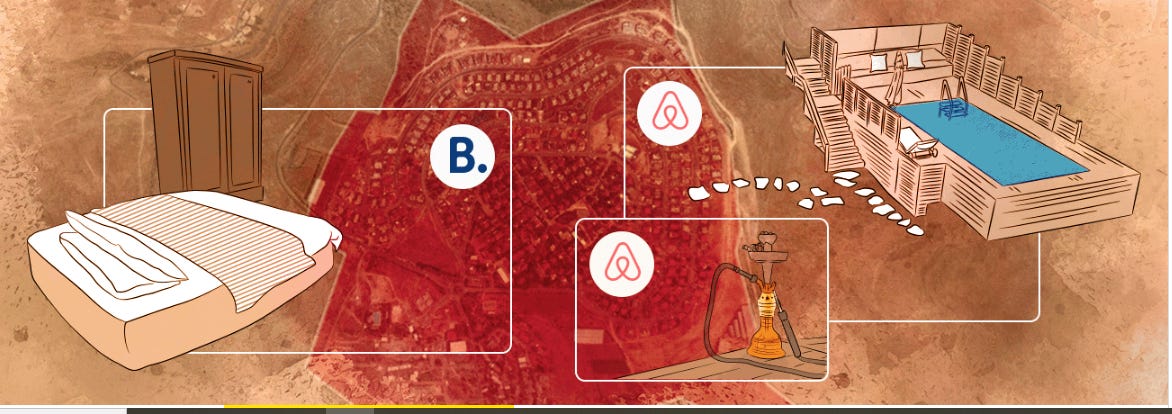
….from the Guardian:
Hotel rooms or holiday rentals listed on both sites were counted only once. Duplicates were removed by assigning holiday lets (those in apartments and houses) as Airbnbs and hotel rooms as Booking.com. Looking at listings instead of properties, there were 402 in total across the West Bank including East Jerusalem – 350 on Airbnb and 52 on Booking.com.
The Airbnb listings found by the Guardian analysis include 18 situated in outposts – settlements considered illegal under international law and also not officially authorised by the Israeli government and against Israeli law.
‘War crimes are not a tourist attraction’
By operating in settlements, multinational companies including Booking.com and Airbnb are violating international law, human rights activists warn. Booking.com and Airbnb are among 16 non-Israeli companies identified by the UN as having ties to Israeli settlements in the West Bank.
“Any company doing business in Israel’s illegal settlements is enabling a war crime and helping to prop up Israel’s system of apartheid,” Kristyan Benedict, Amnesty International UK’s crisis response manager, said in response to the Guardian’s findings.
“With Israeli military forces and settlers having killed and injured huge numbers of Palestinian civilians in the West Bank including East Jerusalem in the last 15 months, tourist companies are making themselves complicit in a blood-soaked system of Israeli war crimes and systematic repression.
“War crimes are not a tourist attraction – Airbnb, Booking.com and the wider business community should immediately sever all links with Israel’s illegal occupation and ongoing annexation of Palestinian territory.”
Sari Bashi, programme director at Human Rights Watch, said that, in allowing properties in Israeli settlements to be listed on their sites, “Airbnb and Booking.com are contributing to land grabs, crippling movement restrictions and even the forced displacement of Palestinians in the occupied West Bank and East Jerusalem, abuses that Israeli authorities commit in order to maintain oppression and domination over Palestinians as part of the crime against humanity of apartheid”.
“Businesses should not enable, facilitate, or profit from serious violations of international law. The time has come for both companies to stop doing business in the occupied territories on stolen land.”

[Photo Credit: (From left) Michelle Obama, her brother Craig Robinson, and Airbnb CEO Brian Chesky during the IMO podcast on May 21, 2025.]
There seems to be no end to the profiteers gouging the world even at the cost of hundreds of thousands dead or dying in that concentration camp now turned into a killing field. It’s as if the scabs America and the west have won through capital-capitalism punishment have turned most in the west into zombies or lobotomies or Stepford Wives and Husbands. Handmaid Tale? Think hard. Read the piece — fiction but oh so real — by Ursula le Guin below this rant. It will run shivers down your spine.
But first, that Airbnb:
Billionaire Airbnb CEO Brian Chesky went back to school prior to the company going public—but it wasn’t to obtain a degree, it was to seek the guidance of a former president. Chesky reveals that during weekly chats with Barack Obama, he would receive “assignments” that revolutionized his leadership.
To build Airbnb into a billion-dollar business, Brian Chesky sometimes worked gruesome 100-hour weeks. However, on top of that, he would regularly carve out time to pick the brains of one of the most important people in the world: former President Barack Obama.
*****
I say it a thousand times — “no precautionary principle, so anything goes; or, “no at first and always do NO harm, so a billion harms are the result,” and, finally, “intended and unintended (usually already known) consequences should be prosecuted as crimes against humanity and ecosystems.”
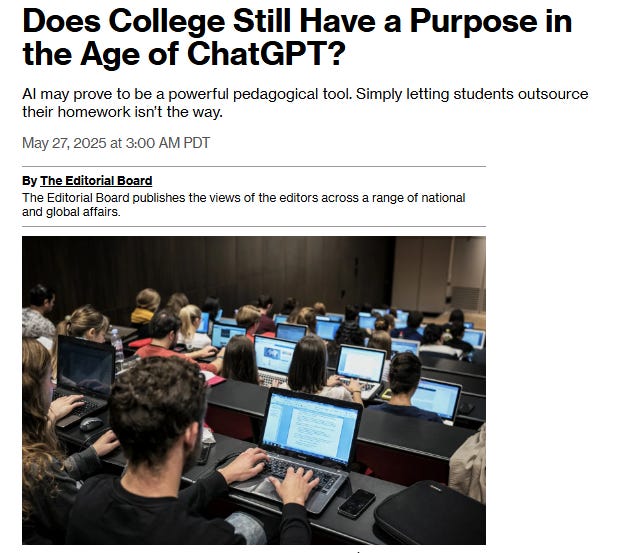
The question is the wrong question, as always with Mainlining Corporate Media, and, well, how about proposing an end to AI — the war on drugs, well, how about the war on AI? No?
And so the most unqualified people in the world, again, his tribal connections count, but I’ll not beat that dead horse, do have a chair at the Star Chamber: Meta’s Mark Zuckerberg Warns Colleges of ‘a Reckoning’ Because They’re Not ‘Preparing People for the Jobs That They Need’

And so it’s not a Mad Mad Mad Mad World of rotten reality TV in real time? Give me a break. Gates and Fink and Ellison and Mark Cuban and Bezos and hell throw in Kissinger or Sean Penn or Ben Stiller, they all, like Zuckerberg, have the world, our world, in the palm of their collective hand.
In a recent interview with comedian Theo Von on his podcast, Meta CEO Mark Zuckerberg offered a blunt critique of the modern college system, questioning its relevance in preparing young people for today’s evolving job market. The remarks add to a growing chorus of skepticism from tech industry leaders about the role and value of higher education in an increasingly skills-driven economy.
“I’m not sure that college is preparing people for the jobs that they need to have,” Zuckerberg said when asked whether he believes college is still necessary in today’s world. “There’s a big issue on that, and all the student debt issues are really big issues. The fact that college is so expensive for so many people.” He did offer the idea that college has its place as a means of living on one’s own, away from one’s parents, while they learn to be an adult. However, the CEO added that the massive debt people often graduate with doesn’t make sense for many.
Oh, insightful nothing burger from that “criminal,” Zuckerberg, with, well, a comic with a podcast? Theodor Capitani von Kurnatowski III?? So, Chromebooks and Zoom Remote School and an end to humanities and history and all the crap they don’t like so they can get partially employed folk who are on universal chump change incomes while their drones and missiles and 100,000 satellites in the heavens and sky can do their dirty work.
And language and such mean nothing. MAHA? Right, tell that to the people in Gaza, even outside of Gaza, where bombs bursting in air, all the dust, all the depleted uranium atoms, well well, how’s that going to work on cancers and birth-defects and birth-deaths? RFK Jr, though, don’t you know, believes Palestinians are spoiled and all Hamas.

Orwell would be spinning in his urn:
As he has promoted the Trump administration’s “Make America Healthy Again” agenda, Robert F. Kennedy Jr., the U.S. Health and Human Services secretary, has lamented the toll that processed foods have taken on the health of Americans, in particular Native Americans.
Prepackaged foods have “mass poisoned” tribal communities, he said last month when he met with tribal leaders and visited a Native American health clinic in Arizona.
Weeks later, in testimony before the House Appropriations Committee, he said processed foods had resulted in a “genocide” among Native Americans, who disproportionately live in places where there are few or no grocery stores.
“One of my big priorities will be getting good food — high-quality food, traditional foods — onto the reservation because processed foods for American Indians is poison,” Kennedy told the committee. Healthy food is key to combating the high rates of chronic disease in tribal communities, he said.
Yet even as the president tasks Kennedy’s agency and the U.S. Department of Agriculture with improving healthy eating programs, the USDA has terminated the very program that dozens of tribal food banks say has helped them provide fresh, locally produced food that is important to their traditions and cultures.
That program — the USDA’s Local Food Purchase Assistance Cooperative Agreement program — began under President Joe Biden in late 2021 as a response to challenges accessing food that were magnified by the pandemic. Its goal was to boost purchases from local farmers and ranchers, and the funding went to hundreds of food banks across the country, including 90 focused on serving tribes.
(Hint hint: Meals on Wheels is on the chopping block, and so are programs to lower prices of groceries for that program and for food banks thoughout the land . . . healthy diets include 800 calories a day for grandma?)
- Google CEO pitches dystopia where no one communicates with their friends anymore because AI’s writing our emails, claims this makes you ‘a better friend’
- ‘They don’t really make life decisions without asking ChatGPT’: OpenAI boss Sam Altman thinks young people turning to chatbots for life advice is ‘cool’
- We need a better name for AI, or we risk talking past each other until actually intelligent AGI comes home mooing
And no, this isn’t another ‘the internet is a series of tubes‘ moment. Think about this for more than half a second and it seems obvious: The high-level interactions that we have in any software is always a veil over the low-level machinations rolling forward underneath. But it’s interesting to be reminded of this fact in the context of a supposedly new phase, paradigm, or stage of computing and the internet.
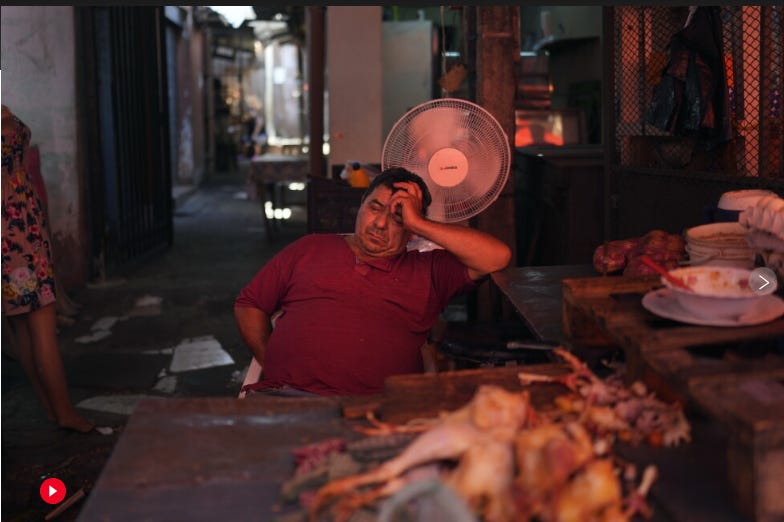
Then this? From the Associated Press? Headlines? AP? I used to respect the outfit, five decades ago. “Get ready for several years of killer heat, top weather forecasters warn.” And so is it AI getting us ready for wet bulb temperatures out the roof? AirB&B? Michelle Obama? DOGE?

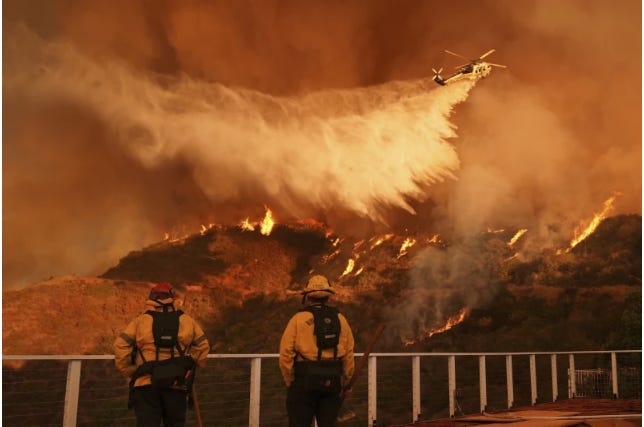

And it all comes down to shit. Sewage and all the other shit. No way forward with this Jerry Springer Show.
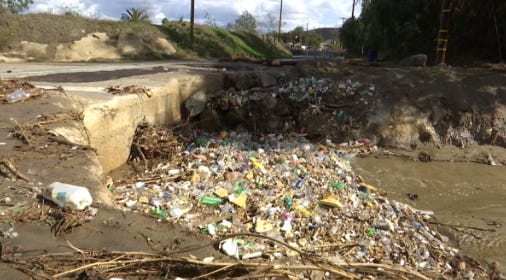
UCSD study: Tijuana sewage isn’t the only pollutant detectible in the air
Researchers found illicit drugs and chemicals from tires in the Tijuana River becoming airborne.
*****
Jewish Springer, Seinfeld, Chuck Barris (Gong Show), Maury Povitch, and Stern, what a Mad Mad Mad Mad World, and now this?
Comedy Central for Jews in Israel? [Israeli police officers assist a Palestinian after he was pushed by right-wing Israelis as they mark Jerusalem Day, in Jerusalem’s Old City, May 26, 2025. (AP Photo/Ohad Zwigenberg)]

The United Arab Emirates lays into Israel over this week’s Jerusalem Flag March, characterizing it as an “annual spectacle of unchecked violence and extremist provocation” and issuing a rare warning against Israel if Jerusalem doesn’t take “decisive steps” against the phenomenon.
“It is utterly unfathomable that, amid the ongoing carnage in Gaza, the Israeli government — underscored by the presence of one of its ministers — continues to permit” the flag march an Emirati official tells The Times of Israel in a statement issued shortly after Abu Dhabi summoned Israel’s ambassador to the Gulf country for a rare reprimand.
Let’s go out with Gerald Horne, a true winner: Oh Canada! and more!! Gerald Horne Around The Horne: G7 Unite Against China, But Is the Era of US World Dominance Over?
“The Ones Who Walk Away From Omelas”
by Ursula K LeGuin – from The Wind’s Twelve Quarters
With a clamor of bells that set the swallows soaring, the Festival of Summer came to the city Omelas, bright-towered by the sea. The ringing of the boats in harbor sparkled with flags. In the streets between houses with red roofs and painted walls, between old moss-grown gardens and under avenues of trees, past great parks and public buildings, processions moved.
Some were decorous: old people in long stiff robes of mauve and gray, grave master workmen, quiet, merry women carrying their babies and chatting as they walked. In other streets the music beat faster, a shimmering of gong and tambourine, and the people went dancing, the procession was a dance. Children dodged in and out, their high calls rising like the swallows’ crossing flights over the music and the singing. All the processions wound towards the north side of the city, where on the great water-meadow called the Green Fields boys and girls, naked in the bright air, with mud-stained feet and ankles and long, lithe arms,exercised their restive horses before the race. The horses wore no gear at all but a halter without bit. Their manes were braided with streamers of silver, gold, and green. They flared their nostrils and pranced and boasted to one another; they were vastly excited, the horse being the only animal who has adopted our ceremonies as his own. Far off to the north and west the mountains stood up half encircling Omelas on her bay. The air of morning was so clear that the snow still crowning the Eighteen Peaks burned with white-gold fire across the miles of sunlit air, under the dark blue of the sky. There was just enough wind to make the banners that marked the racecourse snap and flutter now and then. In the silence of the broad green meadows one could hear the music winding throughout the city streets, farther and nearer and ever approaching, a cheerful faint sweetness of the air from time to time trembled and gathered together and broke out into the great joyous clanging of the bells.
Joyous! How is one to tell about joy? How describe the citizens of Omelas?
They were not simple folk, you see, though they were happy. But we do not say the words of cheer much any more. All smiles have become archaic. Given a description such as this one tends to make certain assumptions. Given a description such as this one tends to look next for the King, mounted on a splendid stallion and surrounded by his noble knights, or perhaps in a golden litter borne by great-muscled slaves. But there was no king. They did not use swords, or keep slaves. They were not barbarians, I do not know the rules and laws of their society, but I suspect that they were singularly few. As they did without monarchy and slavery, so they also got on without the stock exchange, the advertisement, the secret police, and the bomb. Yet I repeat that these were not simple folk, not dulcet shepherds, noble savages, bland utopians. There were not less complex than us.
The trouble is that we have a bad habit, encouraged by pedants and sophisticates, of considering happiness as something rather stupid. Only pain is intellectual, only evil interesting. This is the treason of the artist: a refusal to admit the banality of evil and the terrible boredom of pain. If you can’t lick ’em, join ’em. If it hurts, repeat it. But to praise despair is to condemn delight, to embrace violence is to lose hold of everything else. We have almost lost hold; we can no longer describe happy man, nor make any celebration of joy. How can I tell you about the people of Omelas? They were not naive and happy children–though their children were, in fact, happy. They were mature, intelligent, passionate adults whose lives were not wretched. O miracle! But I wish I could describe it better. I wish I could convince you. Omelas sounds in my words like a city in a fairy tale, long ago and far away, once upon a time. Perhaps it would be best if you imagined it as your own fancy bids, assuming it will rise to the occasion, for certainly I cannot suit you all. For instance, how about technology? I think that there would be no cars or helicopters in and above the streets; this follows from the fact that the people of Omelas are happy people. Happiness is based on a just discrimination of what is necessary, what is neither necessary nor destructive, and what is destructive. In the middle category, however–that of the unnecessary but undestructive, that of comfort, luxury, exuberance, etc.– they could perfectly well have central heating, subway trains, washing machines, and all kinds of marvelous devices not yet invented here, floating light-sources, fuelless power, a cure for the common cold. Or they could have none of that: it doesn’t matter. As you like it. I incline to think that people from towns up and down the coast have been coming to to Omelas during the last days before the Festival on very fast little trains and double-decked trams, and that the trains station of Omelas is actually the handsomest building in town, though plainer than the magnificent Farmers’ Market. But even granted trains, I fear that Omelas so far strikes some of you as goody-goody. Smiles, bells, parades, horses, bleh. If so, please add an orgy. If an orgy would help, don’t hesitate. Let us not, however, have temples from which issue beautiful nude priests and priestesses already half in ecstasy and ready to copulate with any man or woman, lover or stranger, who desires union with the deep godhead of the blood, although that was my first idea. But really it would be better not to have any temples in Omelas–at least, not manned temples. Religion yes, clergy no. Surely the beautiful nudes can just wander about, offering themselves like divine souffles to the hunger of the needy and the rapture of the flesh. Let them join the processions. Let tambourines be struck above the copulations, and the gory of desire be proclaimed upon the gongs, and (a not unimportant point) let the offspring of these delightful rituals be beloved and looked after by all. One thing I know there is none of in Omelas is guilt. But what else should there be? I thought at first there were no drugs, but that is puritanical. For those who like it, the faint insistent sweetness of drooz may perfume the ways of the city, drooz which first brings a great lightness and brilliance to the mind and limbs, and then after some hours a dreamy languor, and wonderful visions at last of the very arcane and inmost secrets of the Universe, as well as exciting the pleasure of sex beyond all belief; and it is not habit-forming. For more modest tastes I think there ought to be beer. What else, what else belongs in the joyous city? The sense of victory, surely, the celebration of courage. But as we did without clergy, let us do without soldiers. The joy built upon successful slaughter is not the right kind of joy; it will not do; it is fearful and it is trivial. A boundless and generous contentment, a magnanimous triumph felt not against some outer enemy but in communion with the finest and fairest in the souls of all men everywhere and the splendor of the world’s summer: This is what swells the hearts of the people of Omelas, and the victory they celebrate is that of life. I don’t think many of them need to take drooz.
Most of the processions have reached the Green Fields by now. A marvelous smell of cooking goes forth from the red and blue tents of the provisioners. The faces of small children are amiably sticky; in the benign gray beard of a man a couple of crumbs of rich pastry are entangled. The youths and girls have mounted their horses and are beginning to group around the starting line of the course. An old woman, small, fat, and laughing, is passing out flowers from a basket, and tall young men wear her flowers in their shining hair. A child of nine or ten sits at the edge of the crowd alone, playing on a wooden flute.
People pause to listen, and they smile, but they do not speak to him, for he never ceases playing and never sees them, his dark eyes wholly rapt in the sweet, thing magic of the tune.
He finishes, and slowly lowers his hands holding the wooden flute.

As if that little private silence were the signal, all at once a trumpet sounds from the pavilion near the starting line: imperious, melancholy, piercing. The horses rear on their slender legs, and some of them neigh in answer. Sober-faced, the young riders stroke the horses’ necks and soothe them, whispering. “Quiet, quiet, there my beauty, my hope…” They begin to form in rank along the starting line. The crowds along the racecourse are like a field of grass and flowers in the wind. The Festival of Summer has begun.
Do you believe? Do you accept the festival, the city, the joy? No? Then let me describe one more thing.

In a basement under one of the beautiful public buildings of Omelas, or perhaps in the cellar of one of its spacious private homes, there is a room. It has one locked door, and no window. A little light seeps in dustily between cracks in the boards, secondhand from a cobwebbed window somewhere across the cellar. In one corner of the little room a couple of mops, with stiff, clotted, foul-smelling heads, stand near a rusty bucket. The floor is dirt, a little damp to the touch, as cellar dirt usually is.
The room is about three paces long and two wide: a mere broom closet or disused tool room. In the room, a child is sitting. It could be a boy or a girl. It looks about six, but actually is nearly ten. It is feeble-minded. Perhaps it was born defective, or perhaps it has become imbecile through fear, malnutrition, and neglect. It picks its nose and occasionally fumbles vaguely with its toes or genitals, as it sits hunched in the corner farthest from the bucket and the two mops. It is afraid of the mops. It finds them horrible. It shuts its eyes, but it knows the mops are still standing there; and the door is locked; and nobody will come. The door is always locked; and nobody ever comes, except that sometimes–the child has no understanding of time or interval–sometimes the door rattles terribly and opens, and a person, or several people, are there. One of them may come in and kick the child to make it stand up. The others never come close, but peer in at it with frightened, disgusted eyes. The food bowl and the water jug are hastily filled, the door is locked; the eyes disappear. The people at the door never say anything, but the child, who has not always lived in the tool room, and can remember sunlight and its mother’s voice, sometimes speaks. “I will be good, ” it says. “Please let me out. I will be good!” They never answer. The child used to scream for help at night, and cry a good deal, but now it only makes a kind of whining, “eh-haa, eh-haa,” and it speaks less and less often. It is so thin there are no calves to its legs; its belly protrudes; it lives on a half-bowl of corn meal and grease a day. It is naked. Its buttocks and thighs are a mass of festered sores, as it sits in its own excrement continually.

They all know it is there, all the people of Omelas. Some of them have come to see it, others are content merely to know it is there. They all know that it has to be there. Some of them understand why, and some do not, but they all understand that their happiness, the beauty of their city, the tenderness of their friendships, the health of their children, the wisdom of their scholars, the skill of their makers, even the abundance of their harvest and the kindly weathers of their skies, depend wholly on this child’s abominable misery.

This is usually explained to children when they are between eight and twelve, whenever they seem capable of understanding; and most of those who come to see the child are young people, though often enough an adult comes, or comes back, to see the child. No matter how well the matter has been explained to them, these young spectators are always shocked and sickened at the sight. They feel disgust, which they had thought themselves superior to. They feel anger, outrage, impotence, despite all the explanations. They would like to do something for the child. But there is nothing they can do. If the child were brought up into the sunlight out of that vile place, if it were cleaned and fed and comforted, that would be a good thing, indeed; but if it were done, in that day and hour all the prosperity and beauty and delight of Omelas would wither and be destroyed. Those are the terms. To exchange all the goodness and grace of every life in Omelas for that single, small improvement: to throw away the happiness of thousands for the chance of happiness of one: that would be to let guilt within the walls indeed.
The terms are strict and absolute; there may not even be a kind word spoken to the child.

Often the young people go home in tears, or in a tearless rage, when they have seen the child and faced this terrible paradox. They may brood over it for weeks or years. But as time goes on they begin to realize that even if the child could be released, it would not get much good of its freedom: a little vague pleasure of warmth and food, no real doubt, but little more. It is too degraded and imbecile to know any real joy. It has been afraid too long ever to be free of fear. Its habits are too uncouth for it to respond to humane treatment. Indeed, after so long it would probably be wretched without walls about it to protect it, and darkness for its eyes, and its own excrement to sit in. Their tears at the bitter injustice dry when they begin to perceive the terrible justice of reality, and to accept it. Yet it is their tears and anger, the trying of their generosity and the acceptance of their helplessness, which are perhaps the true source of the splendor of their lives. Theirs is no vapid, irresponsible happiness. They know that they, like the child, are not free. They know compassion. It is the existence of the child, and their knowledge of its existence, that makes possible the nobility of their architecture, the poignancy of their music, the profundity of their science. It is because of the child that they are so gentle with children. They know that if the wretched one were not there sniveling in the dark, the other one, the flute-player, could make no joyful music as the young riders line up in their beauty for the race in the sunlight of the first morning of summer.
Now do you believe them? Are they not more credible? But there is one more thing to tell, and this is quite incredible.
At times one of the adolescent girls or boys who go see the child does not go home to weep or rage, does not, in fact, go home at all. Sometimes also a man or a woman much older falls silent for a day or two, then leaves home. These people go out into the street, and walk down the street alone. They keep walking, and walk straight out of the city of Omelas, through the beautiful gates. They keep walking across the farmlands of Omelas. Each one goes alone, youth or girl, man or woman.
Night falls; the traveler must pass down village streets, between the houses with yellow- lit windows, and on out into the darkness of the fields. Each alone, they go west or north, towards the mountains. They go on. They leave Omelas, they walk ahead into the darkness, and they do not come back. The place they go towards is a place even less imaginable to most of us than the city of happiness. I cannot describe it at all. It is possible that it does not exist. But they seem to know where they are going, the ones who walk away from Omelas.

This content originally appeared on Dissident Voice and was authored by Paul Haeder.